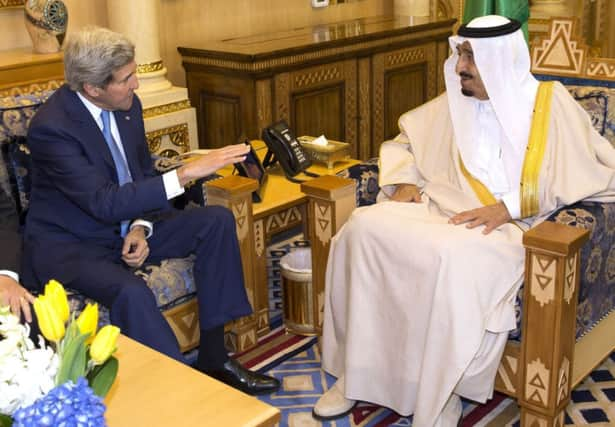US bid to ease Gulf fears over Iran deal


A day after wrapping up the latest round of Iran nuclear negotiations in Switzerland, Mr Kerry was in Saudi Arabia for talks with senior officials from the Sunni-ruled Gulf states and the new Saudi monarch King Salman.
Mr Kerry was in the Saudi capital of Riyadh to meet the foreign ministers of the Gulf Co-operation Council (GCC) – Bahrain, Kuwait, Oman, Qatar, Saudi Arabia and the United Arab Emirates, all of which are unnerved by Iran’s suspected pursuit of nuclear weapons and its increasing assertiveness throughout the region.
Advertisement
Hide AdAdvertisement
Hide AdUS officials said Mr Kerry will reassure them that a deal with Tehran will not allow Iran to develop the bomb and any agreement will not mean American complacency on broader security matters.
Iran is actively supporting forces fighting in Syria and Iraq and is linked to Shiite rebels who recently toppled the US and Arab-backed government in Yemen.
Mr Kerry will tell them that no matter what happens at the Iranian nuclear talks, the US will continue to confront “Iranian expansion” and “aggressiveness” in the region and work closely with the Gulf states on security and defence capabilities.
Gulf countries, like Israel and many Western states, fear that Iran is using its atomic programme to develop nuclear weapons capability, something Tehran denies.
Israeli prime minister Benjamin Netanyahu told the US Congress this week that the deal being negotiated by Washington and other world powers was a serious mistake.
Sunni Muslim Saudi Arabia regards Shiite Iran as its main rival and the two countries back opposing sides in wars and political struggles in Syria, Iraq, Lebanon and Yemen, often along sectarian lines.
On Yemen, the officials said Mr Kerry will reiterate that the US supports UN efforts to promote talks leading to a political transition in Yemen, which is embroiled in a political crisis that threatens to split the country.
The UN-mediated talks are aimed at breaking the political stalemate between Houthi rebels and Yemeni president Abed Rabbo Mansour Hadi.
Advertisement
Hide AdAdvertisement
Hide AdMr Hadi fled the capital Sanaa after being released from house arrest last month and is now based in the southern city of Aden, from where he has been meeting foreign diplomats, including the US ambassador.
Mr Hadi has called for the relocation of embassies to Aden, as several GCC members have done already.
The US, which closed its embassy in Sanaa last month, has no plans to relocate to Aden, although the US ambassador to Yemen, Matthew Tueller, met Mr Hadi in Aden on Monday.
Until the crisis is resolved and the embassy reopened, Mr Tueller and his staff will be based in an office at the US Consulate in Jiddah, Saudi Arabia, officials said.
In addition to the Iranian nuclear issue and Yemen, Mr Kerry will also discuss the deteriorating conditions in Syria and the fight against Islamic State group militants there and in Iraq.
US officials said Mr Kerry would stress the US does not see a military solution to the conflict in Syria, but also does not think a political solution is possible while Syrian president Bashar al-Assad remains in power.
FOLLOW US
SCOTSMAN TABLET AND MOBILE APPS